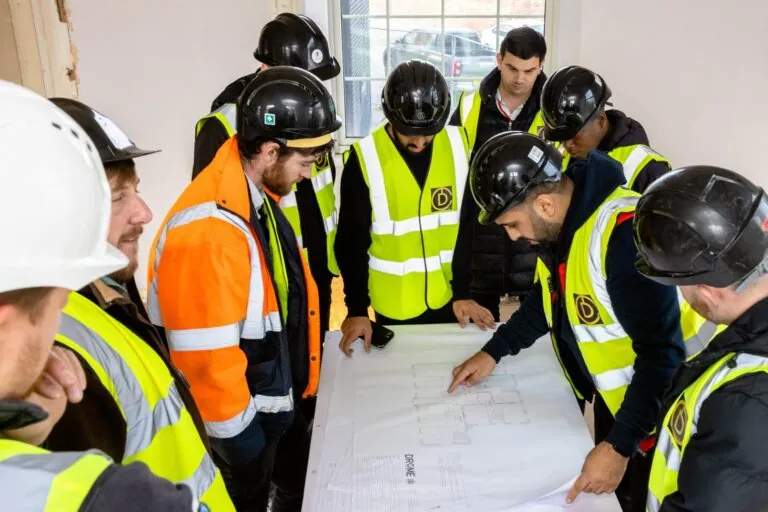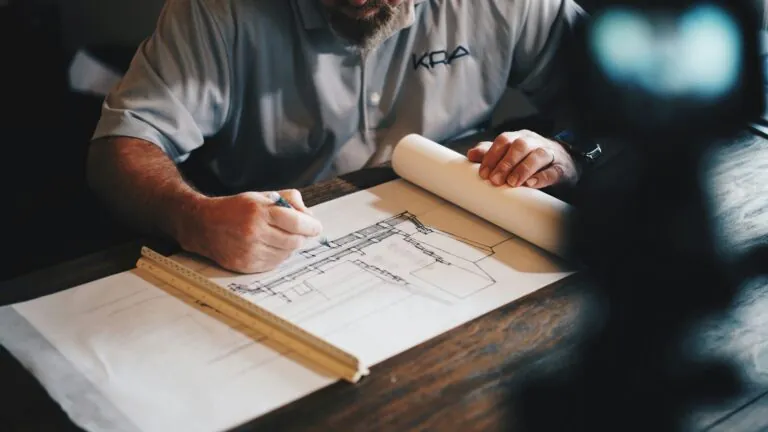Let me start with a story. At age 15, I was done with school. Not “done” as in graduated, capped, and gowned (believe me, I was no child prodigy) – done as in I walked out the school gates one last time, ready to trade books for bricks.
My first proper job? Sweeping up sawdust, lifting plasterboard, and getting the coffees in construction.
Over the next decade or so, I completed a trade apprenticeship, worked a few years on the tools, and progressed into management. I ended up working as a client-side project manager for one of the globe’s top construction consultancies. However, this entire time, one thing was missing – I’d never set foot in a university.
Fast-forward a few years, and while starting my own construction company, I decided to bite the bullet and complete an undergraduate degree in construction management.
However, was it necessary? Did it help my career? Did I learn anything new? After all, by this time, I had worked over a decade in the industry without anyone even bothering to ask what qualifications I had.
So, do you need a construction degree to make it in this business? Not necessarily. But should you? Well, that depends. Let’s break it down.
What This Article Covers:
- The True School of Construction: The Jobsite
- Construction Degrees: The Shiniest Tool in the Toolbox
- Types of Construction Degrees and Study Methods
- How to Study Construction: Picking the Right Path
- My Own Construction Degree Journey
- Construction Degree or No Degree: What Really Matters
- Lessons from 15-Year-Old Me
The True School of Construction: The Jobsite
The thing about construction is it’s not a one-size-fits-all career. There’s no single route to success. Some folks enter the industry with shiny diplomas, while others, like me, take the scenic route through the trenches. And by trenches, I mean literal trenches.
I believe that both routes have benefits, and both have their setbacks, however, the important point is there is no right or wrong way to do things.
When I started, I couldn’t tell a joist from a jamb. But that didn’t matter, because in construction, the best education you can get isn’t in a lecture hall – it’s on the job site.
When I first started, I was very conscious of how new I was. There was teenage me, trying not to look stupid as I struggled to even maneuver a wheelbarrow around the site, yet when I watched the veteran tradies, they made everything look so easy.
And what I learned over canteen cups of tea and snack van rolls, was that there was only one way to learn these abilities: by doing it. Over and over and over again.
And it wasn’t just about learning how to handle tools and build houses, practical experience builds more than hands-on skills – it builds character, relationships, and a sixth sense for when someone’s about to cut a corner (or skive by “looking for their caulk gun in the van” for an hour).
Construction Degrees: The Shiniest Tool in the Toolbox
Now, don’t get me wrong. Degrees have their place. They’re great for giving you the theoretical foundation – stuff like contract law, structural loads, sustainability, and other fancy terms that make you sound clever in meetings.
A degree can also fast-track your career if you’re aiming for specialist roles like project management, planning, or quantity surveying. However, in my experience, employers may be impressed by a degree certificate, but they rarely require, or even ask for one. The simple question is can you do the job or not? And in construction, there is no place to hide – if you can’t get the task done, it will be obvious within minutes.
That’s because there are some things they simply don’t teach you at university: how to deal with a subcontractor who swears they’ll be on-site “first thing Monday” and then ghosts you until Thursday. Or how to get a crane operator to “hurry up a bit” without accidentally offending them and causing a site drama.

Types of Construction Degrees and Study Methods
Not all construction degrees are created equal. They’re as varied as the projects you’ll work on – some focus on managing teams, others on crunching the numbers. Here’s a breakdown of a few common types:
Construction Management
This is what I did, and is the bread-and-butter degree for anyone aiming to move up the ranks into project management, operations management, or contract roles. It covers everything from site operations to financial forecasting, health and safety, and a bit of legal lingo for good measure. If you want to be the person holding the clipboard on site and making the calls, this is the degree for you.
Civil or Structural Engineering
Want to build bridges – literally? Civil or structural engineering degrees go deep into the technical side of construction. You’ll learn about structural design, materials science, and how to make sure the things we build can stand up to wind, rain, and the odd earthquake.
Quantity Surveying
This one’s for the numbers folk. Quantity surveying degrees focus on cost control, procurement, and contracts. If you’re the kind of person who gets excited about spreadsheets and keeping projects on budget, this degree might be calling your name.
Architecture and Architectural Technology
For the creatives out there, architecture degrees mix art and science, teaching you to design buildings that are both beautiful and functional. Architectural technology focuses more on the technical side – how to turn those designs into reality.
Sustainable Construction
Degrees like environmental construction or sustainable design focus on things like green building practices, energy efficiency, and reducing the carbon footprint of construction. It’s the way forward, and if you’re passionate about the planet, it’s worth exploring.
How to Study Construction: Picking the Right Path
Just like there’s no one-size-fits-all degree, there’s no single way to study. Whether you’re starting out or juggling work and life, there’s an option to suit you:
Full-Time Study
The classic route. A full-time degree at a university or college typically takes three to four years. You’ll have lectures, exams, and (if the course is good) a placement year to get some real-world experience. It’s the fastest way to get qualified, but you’ll need to commit to the classroom for a chunk of time.
Part-Time Study
If you’re already working in the industry, part-time study lets you earn while you learn. Courses are spread out over evenings, weekends, or online sessions, so you can fit your studies around your day job. It takes longer – five to six years in some cases – but you won’t need to pause your career to do it.
Apprenticeships
The hands-on option. Degree apprenticeships are becoming increasingly popular in construction, combining on-the-job training with university study. You’ll work with an employer, get paid, and graduate with a degree at the end of it – minus the student debt.
Online and Distance Learning
Ideal for those who need flexibility. Many universities now offer online degrees where you can study from home. Modules are often self-paced, meaning you can tackle coursework on your schedule. Just be prepared to stay disciplined – it’s easy to fall behind when there’s no one keeping tabs on you.
Which Study Option Is Right for You?
Choosing the right degree and study method depends on where you are in your career and where you want to go. If you’re fresh out of school and ready to commit, full-time study is the standard route. But if you’re already in the industry, part-time study, apprenticeships, or short-distance learning lets you build your skills without losing momentum.
The beauty of construction is that it welcomes all kinds of learners. Whatever path you choose, the most important thing is making sure it fits your goals, lifestyle, and ambitions.

(unsplash.com)
My Own Construction Degree Journey
When I finally went back to school (or rather, university) to study construction management, I was surprised by the mix of people in the room. There were, of course, plenty of students straight from high school, however, there was also a fair number of people already working in the industry, like myself.
One of the questions you may ask is why I bothered with the degree. Two reasons:
- I wanted to get better at the industry I’d fallen for – budgeting, tendering, and planning were all terms I had heard, but didn’t truly understand in the same way I knew how to build stud walls or measure up roof trusses.
- I figured it wouldn’t hurt to have a piece of paper that said, “Hey, I know my stuff.” Even if no one really cared.
The funny thing? Half the time in lectures, I’d think, “I already know this!” because I’d lived it. The other half, I’d think, “I wish someone told me this earlier!” because it explained the why behind the what.
Did the degree make me better at my job? Yes, but only because I already had years of dirt-under-the-fingernails experience to put it into context.
Construction Degree or No Degree: What Really Matters
So, back to the big question: do you need a construction degree? Here’s my take.
If you’re already in the industry, doing the hard graft, and climbing the ladder, you probably don’t need one. Practical experience, a good work ethic, and building the right relationships will get you where you need to be.
But if you’re starting out, or aiming for senior roles at big firms, a degree could be the leg up to fast-track your career opportunities.
It’s like power tools – they don’t do anything that old-fashioned hand tools can’t do, but they will for sure get you there quicker – however, every good tradesperson knows their way around hand tools like a quantity surveyor knows their way around a red pen.
The key is balance. Don’t let a lack of a degree hold you back, but don’t let having one make you think you’re above getting your hands dirty. Construction is a team sport, and respect is earned with effort, not credentials.
If you are, however, aspiring to get into a specialty such as architecture, engineering, or surveying, higher education will be a necessary step into that journey.
That’s not to say, however, that you can’t get started in the industry without one, and there are plenty of flexible study options that will allow you to study while working on the job.
Lessons from 15-Year-Old Me
Looking back, 15-year-old me wouldn’t have cared about degrees. He just wanted to earn a few bucks and maybe, one day, run his own projects.
Now, with over 15 years under my belt, I can say this: a degree won’t build your career, but the right attitude, experience, and willingness to learn will. If you get a degree along the way, great. If not, don’t sweat it.
If you are going to go for it, do it because you want to, not because you feel you ‘have to’.
Because at the end of the day, construction isn’t about what’s on paper. It’s about showing up, solving problems, and building something that lasts. That’s what people in the industry care about.



